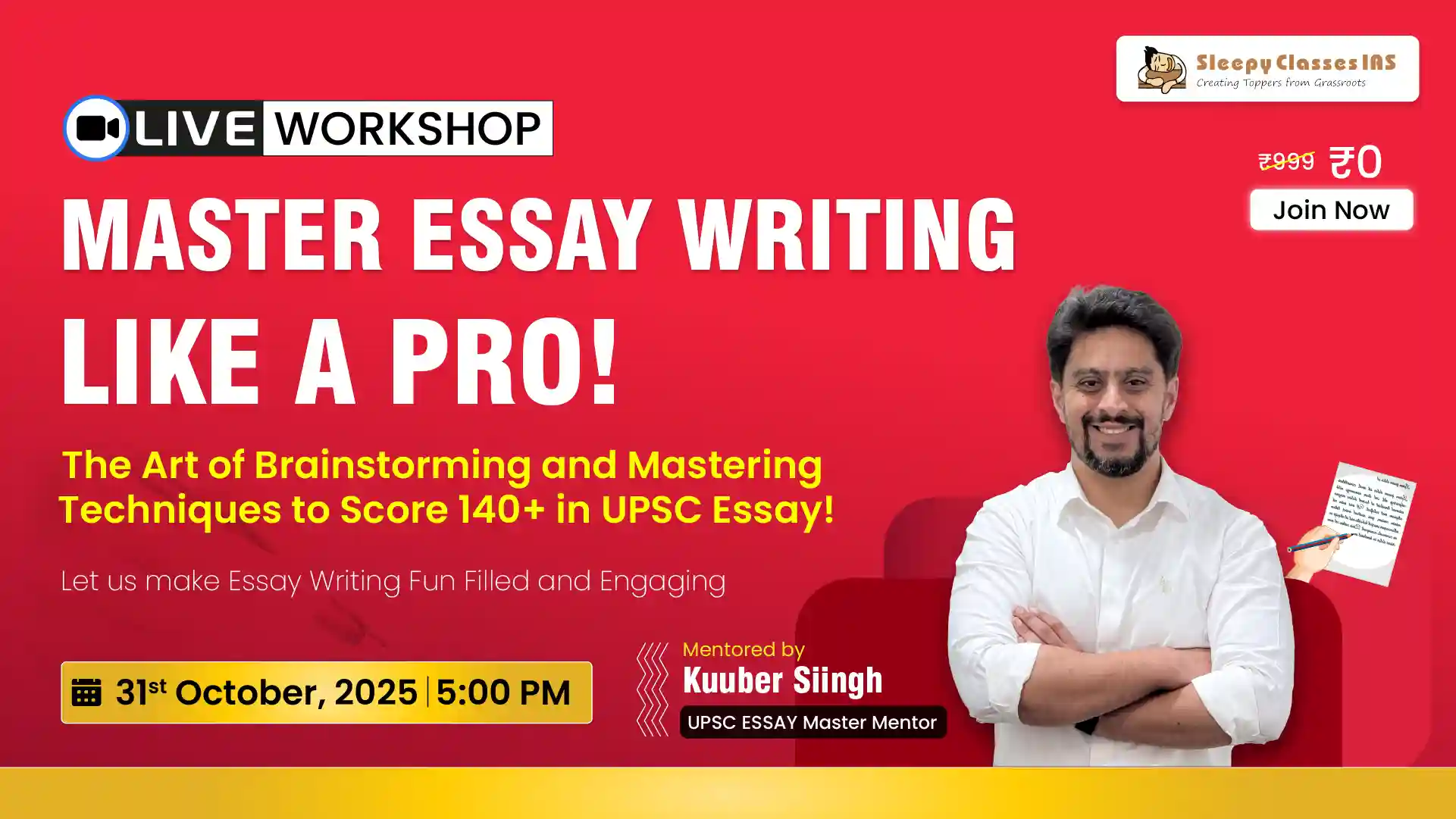A Comprehensive Strategy for Understanding Indian Politics for UPSC Mains
Preparing for Indian politics for UPSC Mains can seem overwhelming due to the breadth of topics it encompasses, including governance, federalism, constitutional frameworks, political ideologies, and electoral dynamics. However, by adopting a strategic approach, aspirants can master “Indian politics for UPSC Mains” and improve their answer-writing skills for this subject. This blog provides a structured guide on how to study Indian politics effectively, with resources from Sleepy Classes and additional external sources.
1. Understand the Syllabus and Key Areas
The first step is to thoroughly understand the syllabus of Indian politics for UPSC Mains. Key areas include:
- Constitutional Development and Evolution
- Indian Federalism and Centre-State Relations
- Political Dynamics: Electoral Processes, Voting Behavior, and Political Parties
- Role of Key Institutions: Parliament, Executive, and Judiciary
- Panchayati Raj Institutions (PRI) and Local Governance
Knowing these topics will help you organize your preparation and avoid unnecessary diversions. For more details on the specific syllabus, you can refer to the UPSC CSE Syllabus page on Sleepy Classes.
2. Study Standard Textbooks and Reference Materials
To build a strong foundation in Indian politics for UPSC Mains, it’s essential to use recommended textbooks:
- Indian Polity by M. Laxmikanth – A comprehensive book that covers nearly all topics in Indian politics.
- Introduction to the Constitution of India by D.D. Basu – This book is excellent for understanding the nuances of the Indian Constitution.
- Our Parliament by Subhash Kashyap – A detailed guide on the functioning of the Indian Parliament.
For additional insights on reference materials, Sleepy Classes Recommended Books for UPSC is a great resource.
3. Use Online Courses and Video Lectures
Online courses and video lectures can simplify complex topics and help in revising faster. Sleepy Classes offers specialized courses in Indian politics, with an emphasis on interactive learning and updated study material. Their General Studies 2025 program includes comprehensive modules on Indian politics and is particularly helpful for aspirants looking to dive deep into the subject.
Additionally, YouTube is a valuable platform for free video lectures. Channels like Rajya Sabha TV’s “Big Picture” discussions offer nuanced discussions on current political issues and constitutional debates, which can help in writing better answers in the Mains.
4. Current Affairs and Analysis
Indian politics for UPSC Mains requires a strong grip on current affairs, as many questions are directly or indirectly related to recent political developments. Use reputable sources such as:
- The Hindu and Indian Express for daily news.
- PIB (Press Information Bureau) for government updates.
- Sleepy Classes Current Affairs for UPSC – Their curated current affairs materials and monthly updates can help you stay on top of important political events.
Following these resources ensures you are aware of the latest developments, which is crucial for building a contextual understanding of Indian politics.
5. Answer Writing Practice
Answer writing is a crucial component in mastering Indian politics for UPSC Mains. Practice regularly to improve your writing speed, clarity, and structure. A few tips to keep in mind while writing:
- Start with a strong introduction that highlights the essence of the topic.
- Use subheadings to organize different parts of the answer.
- Include examples and case studies – For instance, when discussing federalism, mention the GST Council and recent discussions on Centre-State relations.
- Conclude with balanced perspectives, emphasizing the importance of reforms or improvements.
Sleepy Classes Test Series offers excellent practice tests and model answers, making it an effective way to refine your answer-writing skills.
6. Use Diagrams and Flowcharts
Diagrams can help illustrate concepts effectively and add value to your answers. For example:
- Flowcharts can show the relationship between different branches of government.
- Venn diagrams can compare and contrast topics such as federalism and unitary features.
Practice incorporating at least one diagram in every long answer to enhance clarity.
7. Integrate Case Studies and Examples
Examples and case studies not only enrich your answer but also demonstrate your depth of knowledge. Mention landmark judgments like Keshavananda Bharati Case and SR Bommai Case to highlight constitutional aspects of federalism and secularism.
For contemporary case studies, refer to the PSIR Optional – Syllabus & PYQs on Sleepy Classes, which provides relevant examples that can be used in your GS papers as well.
8. Revision Techniques
Regular revision is essential. Make brief notes on key topics, important articles, and case laws. Use resources like IGNOU and NIOS materials, which offer simplified versions of complex topics.
Weekly or bi-weekly quizzes available on Sleepy Classes can also help in testing your memory and retention of important topics in Indian politics for UPSC Mains.
9. Participate in Discussion Forums
Engaging in discussions with fellow aspirants can broaden your perspectives on Indian politics. Platforms like the Telegram Channel of Sleepy Classes and Reddit’s UPSC forum are excellent for sharing insights, clearing doubts, and understanding different viewpoints on political issues.
10. Additional Online Resources
External websites such as:
- PRS India – For legislative research and understanding bills, parliamentary procedures, and reports.
- Ministry of Parliamentary Affairs – For authentic information on parliamentary proceedings.
- Law Commission of India – To access recommendations and reports that impact Indian politics.
By using these resources and following the above strategies, aspirants can effectively prepare Indian politics for UPSC Mains. Consistency, regular practice, and in-depth understanding are essential to perform well in this crucial section. Mastering Indian politics not only enhances your scores but also enriches your perspective on governance and democracy.







